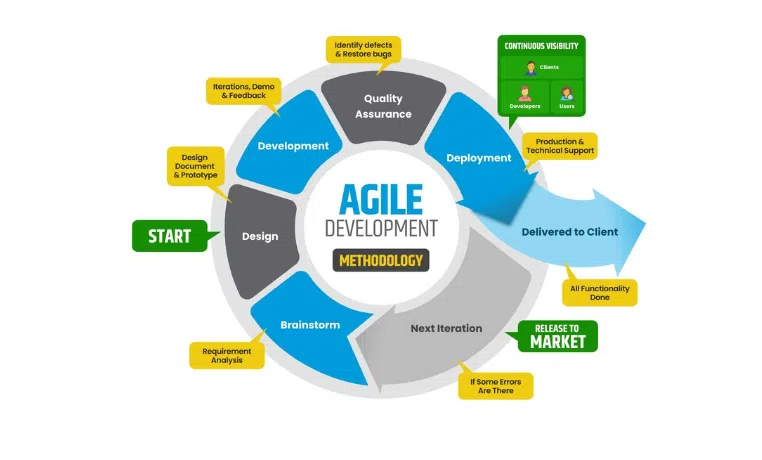Software Development for Startups with Agile: Accelerating Time-to-Market
In the rapidly evolving world of technology, startups must leverage every advantage to stay competitive. Agile methodologies have emerged as a powerful approach, particularly in software development for startups, to accelerate time-to-market and enhance product quality. By focusing on iterative development, Agile allows teams to adapt quickly to changes and deliver incremental improvements, ensuring that the final product aligns with user needs and business objectives. As a top 10 software development company in Vietnam, Savvycom offers value-for-money tech solutions and can help startups accelerate their time-to-market and enhance product quality.

Agile methodology in software development for startups
Understanding Agile in Software Development for Startups
Agile methodologies prioritize flexibility, collaboration, and customer feedback, making them particularly suitable for startups. Unlike traditional waterfall models, which follow a linear and often rigid progression, Agile promotes continuous iteration and improvement. This approach enables startups to launch products faster and refine them based on real-world feedback.
Agile methodology is defined by several foundational principles that drive its approach to software development and project management:
-
Iterative Development: Agile emphasizes delivering small, workable increments of the software, allowing for frequent user feedback and continuous improvement. This iterative approach ensures that the project evolves incrementally based on stakeholder input and changing requirements.
-
Collaboration: Agile fosters close collaboration among cross-functional teams, including developers, designers, and business stakeholders. By encouraging daily interactions and face-to-face communication, Agile teams can quickly address issues, share knowledge, and align on project goals.
-
Customer-Centric Approach: Agile methodologies prioritize customer satisfaction by integrating user feedback throughout the development process. This customer-centric approach ensures that the final product meets user expectations and addresses real-world needs effectively.
-
Flexibility: Agile methodologies are designed to accommodate changes and new requirements, making them ideal for the dynamic nature of startups. By embracing change and responding quickly to market shifts or evolving priorities, Agile teams can adapt their approach and deliver value more effectively.
These core principles enable Agile teams to deliver high-quality software that aligns with business objectives, enhances user satisfaction, and adapts seamlessly to the challenges of modern software development.
Looking For a Trusted Tech Partner?
We’ll help you decide on next steps, explain how the development process is organized, and provide you with a free project estimate.
The Role of DevOps Agile Integration (DAI)
DevOps Agile Integration (DAI) takes Agile to the next level by integrating DevOps principles. This approach blends the iterative nature of Agile with the automation and efficiency of DevOps, fostering a culture of collaboration, transparency, and constant learning when creating Software Development for Startups.
How DAI Works
- Culture Shift: DAI begins with a cultural shift, breaking down barriers between development, operations, and other stakeholders. Teams collaborate closely, sharing knowledge and taking collective ownership of the product.
- Iterative Development: Like Agile, DAI emphasizes iterative development, allowing teams to deliver incremental updates and gather feedback continuously.
- Automation and Continuous Integration: DevOps principles bring automation to the forefront, speeding up development processes and reducing errors. Continuous integration ensures frequent code integration and testing, leading to faster feedback and higher-quality software.
- Feedback Loops: DAI thrives on feedback loops, continuously soliciting input from users and stakeholders to improve the product iteratively.
Implementing Agile and DAI in Software Development for Startups
Adopting Agile and DAI can significantly enhance project management and software development processes, particularly for startups. By educating and training teams, breaking down silos, automating processes, and establishing clear metrics, startups can avoid common pitfalls and deliver high-quality software on time.

Implementing Agile Methodology in Startups with the Software Development Life Cycle
Educate and Train Teams
To successfully implement Agile and DAI, start by providing comprehensive training to your teams. This training should cover Agile principles such as iterative development, collaboration, and customer feedback. Additionally, introduce DevOps practices that emphasize automation and continuous integration/continuous deployment (CI/CD). Ensure everyone on the team understands the significance of these methodologies and how they contribute to improved efficiency and product quality. Training sessions, workshops, and certification programs can help solidify this knowledge and prepare your team for the transition.
Break Down Silos
Fostering a culture of collaboration is essential for Agile and DAI to succeed. Break down organizational silos that separate development, operations, and other departments. Encourage cross-functional communication and collective problem-solving to enhance productivity and innovation. Regular meetings, integrated project management tools, and a shared vision can help align different teams towards common goals. This collaborative environment ensures that issues are identified and addressed promptly, leading to faster and more efficient project completion.
Automate Processes
Automation is a cornerstone of DevOps and a key enabler of Agile methodologies. Identify opportunities for automation within your development and deployment processes. Invest in tools and infrastructure that support CI/CD pipelines to streamline workflows and reduce manual effort. Automation can significantly decrease the time required for testing and deploying new code, allowing for more frequent releases and quicker feedback cycles. This approach not only accelerates the development process but also reduces the likelihood of human error, enhancing overall product quality.
Establish Metrics and Track Progress
To gauge the success of your Agile and DAI initiatives, implement metrics that provide actionable insights. Key performance indicators (KPIs) such as deployment frequency, lead time, and customer satisfaction are crucial for tracking progress. Regularly review these metrics to identify areas for improvement and to ensure that your processes align with business objectives. Use data-driven insights to make informed decisions and to continuously refine your Agile and DevOps practices. This ongoing assessment helps maintain high standards and adapt to changing needs effectively.
Case Studies: Agile and DAI in Software Development for Startups in Action
Case Study 1: Accelerating Product Development for a Fintech Startup
Challenge: A fintech startup needed to accelerate the development of its mobile app to stay competitive in the market.
Solution: The startup adopted Agile methodologies, emphasizing iterative development and frequent user feedback. They also integrated DevOps practices, automating testing and deployment processes.
Outcome: The fintech startup reduced its time-to-market by 30%, according to a 2023 DevOps Pulse survey,, launching a high-quality product that quickly gained user acceptance and market share.
Case Study 2: Enhancing Collaboration for a Healthtech Startup
Challenge: A healthtech startup faced challenges with siloed teams and slow development cycles.
Solution: By implementing DevOps Agile Integration, the startup fostered a culture of collaboration and continuous improvement. They automated key processes and established regular feedback loops with users.
Outcome: The healthtech startup saw a significant increase in development speed and product quality, resulting in improved customer satisfaction and business growth.
Case Study 3: Scaling Development for an E-commerce Startup
Challenge: An e-commerce startup needed to scale its development processes to handle rapid growth and changing market demands.
Solution: The startup adopted Agile methodologies combined with DevOps practices. They focused on iterative development, automation, and continuous integration to streamline workflows and enhance flexibility.
Outcome: The e-commerce startup achieved greater scalability and responsiveness, allowing them to quickly adapt to market changes and expand their product offerings.
F AQs: More about Software Development for Startups
What is Agile, and why is it important for startups?
Agile is a methodology that emphasizes flexibility, collaboration, and iterative development. It allows teams to break down projects into small, manageable increments, enabling continuous delivery and adaptation. For startups, Agile is crucial because it fosters rapid response to market changes, reduces time-to-market, and ensures that products evolve in alignment with user needs and business goals. This iterative process helps startups to prioritize features based on customer feedback and market demand, ensuring they build relevant and competitive products.
How does DevOps Agile Integration (DAI) enhance Agile methodologies?
DevOps Agile Integration (DAI) enhances Agile methodologies by merging Agile's iterative development approach with DevOps principles like automation, continuous integration, and continuous delivery. This integration accelerates the software development lifecycle by streamlining processes and reducing the time between development and deployment. DAI fosters a culture of collaboration between development and operations teams, minimizes errors through automated testing and deployment, and promotes continuous improvement, ultimately leading to more reliable and scalable software solutions.
What are the key benefits of using Agile in software development for startups?
The key benefits of using Agile in software development for startups include:
- Faster Time-to-Market: Agile allows startups to deliver product increments quickly, enabling faster release cycles and quicker realization of business value.
- Improved Product Quality: Through regular testing and continuous feedback, Agile helps identify and address defects early, leading to higher quality products.
- Greater Flexibility: Agile's iterative nature allows startups to pivot and adapt to changing market conditions and customer requirements seamlessly.
- Better Alignment with Customer Needs: Agile encourages continuous feedback from customers, ensuring that the product evolves based on user input and stays relevant to market demands.
How can startups get started with implementing Agile and DAI?
Startups can begin implementing Agile and DAI by:
Educating and Training Teams: Provide comprehensive training on Agile principles and DevOps practices to ensure all team members understand the methodologies and their benefits.
Breaking Down Silos: Foster a collaborative environment where development, operations, and other stakeholders work closely together, sharing knowledge and responsibilities.
Automating Processes: Implement automation tools for continuous integration, testing, and deployment to streamline workflows and reduce manual errors.
Establishing Metrics: Set up metrics to track progress and performance, such as cycle time, deployment frequency, and defect rates, to ensure continuous improvement and alignment with business goals.
Are you a startup founder looking to build a software product or interested in working with startups? This video is for you!
Conclusion
Adopting Agile methodologies and DevOps Agile Integration (DAI) in Software Development for Startups can significantly accelerate time-to-market, enabling them to deliver high-quality products that meet customer needs. By leveraging the power of Agile and DAI, startups can not only speed up their development cycles but also create products that truly resonate with their users. If you’re looking for expert guidance and support, reach out to Savvycom, a top-tier software development company in Vietnam.
Tech Consulting, End-to-End Product Development, Cloud & DevOps Service! Since 2009, Savvycom has been harnessing digital technologies for the benefit of businesses, mid and large enterprises, and startups across the variety of industries. We can help you to build high-quality software solutions and products as well as deliver a wide range of related professional software development services.
Savvycom is right where you need. Contact us now for further consultation:
- Phone: +84 24 3202 9222
- Hotline: +1 408 663 8600 (US); +612 8006 1349 (AUS); +84 32 675 2886 (VN)
- Email: [email protected]


